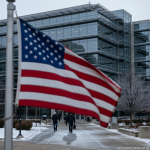Unprecedented Call for Action
In a significant political move, New York City Mayor-elect Zohran Mamdani has called for a nationwide boycott of Starbucks, aligning with the 'No Contract, No Coffee' campaign led by unionized baristas. This call to action is framed amidst accusations of unfair labor practices at Starbucks stores across the United States, where over 11,000 workers have mobilized under Workers United, according to Wikipedia. Mamdani's stance marks a critical juncture in labor advocacy, amplifying the voices of those seeking fair employment terms.
Mamdani, in his statement reported by NDTV, emphasized the importance of supporting labor rights and discouraging consumers from purchasing Starbucks products until a fair contract is negotiated. This development could significantly impact Starbucks' market performance and align with previous instances of consumer activism impacting corporate policies.

Background and Developments
The labor dispute at Starbucks dates back to February 2024, when negotiations for a collective bargaining agreement commenced, as ABC News highlights. Despite intermittent progress, the tension culminated in a widespread strike termed the 'Red Cup Rebellion'. Advocates argue that Starbucks' offers failed to meet the employees' minimum wage and working condition demands.
Economic and Political Ramifications
The call for a boycott carries potential economic implications. Analysts, including those at The Boston Globe, have speculated on the impact prior boycotts have had on Starbucks, such as an $11 billion market value reduction during previous disputes. Furthermore, Mamdani's endorsement signals a rare political engagement in corporate labor policies, potentially setting a precedent for future municipal leadership roles in national labor matters.
A Broader Labor Movement?
As discussions around fair labor practices grow, Mamdani's actions may inspire similar initiatives aiming to challenge large corporations on their employment standards. With a focus on transparency and accountability, stakeholders believe these movements could reshape the screen on corporate governance. The outcome of the Starbucks saga may serve as a bellwether for other industries facing similar worker grievances.
Looking Forward
The path forward remains uncertain. While Starbucks has attempted to reignite bargaining, as indicated by Fortune, the sustained actions of unionized workers illuminate a deep-rooted need for systemic change. Whether this boycott will sway Starbucks' strategy or embolden its workforce remains to be seen, but the stakes for corporate excellence in labor practices have undeniably been raised.









